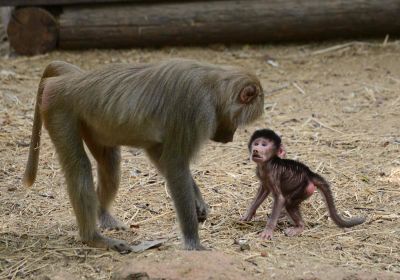Infanticide in Primates: Difference between revisions
| Line 1: | Line 1: | ||
==Introduction== | ==Introduction== | ||
THIS IS A PAGE BY MEHERET OURGESSA <br> | THIS IS A PAGE BY MEHERET OURGESSA <br> | ||
Infanticide generally refers to the killing of an infant by any other individual and is observed in a variety of species from humans to microscopic rotifers. In non-human primates, it is used to refer to the killing of a dependent young | Infanticide generally refers to the killing of an infant by any other individual and is observed in a variety of species from humans to microscopic rotifers. In non-human primates, it is used to refer to the killing of a dependent young | ||
by another individual of the same species. Several explanations have been <br> | by another individual of the same species. Several explanations have been <br> | ||
proposed for the existence of infanticide in non-human primate communities. <br> | proposed for the existence of infanticide in non-human primate communities. <br> | ||
Revision as of 15:58, 27 October 2019
Introduction
THIS IS A PAGE BY MEHERET OURGESSA
Infanticide generally refers to the killing of an infant by any other individual and is observed in a variety of species from humans to microscopic rotifers. In non-human primates, it is used to refer to the killing of a dependent young
by another individual of the same species. Several explanations have been
proposed for the existence of infanticide in non-human primate communities.
The topic must include one section about microbes (bacteria, viruses, fungi, or protists). This is easy because all organisms and ecosystems have microbes.
Compose a title for your page.
Type your exact title in the Search window, then press Go. The MicrobeWiki will invite you to create a new page with this title.
Open the BIOL 116 Class 2019 template page in "edit."
Copy ALL the text from the edit window.
Then go to YOUR OWN page; edit tab. PASTE into your own page, and edit.
At right is a sample image insertion. It works for any image uploaded anywhere to MicrobeWiki. The insertion code consists of:
Double brackets: [[
Filename: PHIL_1181_lores.jpg
Thumbnail status: |thumb|
Pixel size: |300px|
Placement on page: |right|
Legend/credit: Electron micrograph of the Ebola Zaire virus. This was the first photo ever taken of the virus, on 10/13/1976. By Dr. F.A. Murphy, now at U.C. Davis, then at the CDC.
Closed double brackets: ]]
Other examples:
Bold
Italic
Subscript: H2O
Superscript: Fe3+
Section 1 Genetics
Include some current research, with at least one image.
Sample citations: [1]
[2]
A citation code consists of a hyperlinked reference within "ref" begin and end codes.
Section 2 Microbiome
Include some current research, with a second image.
Conclusion
Overall text length should be at least 1,000 words (before counting references), with at least 2 images. Include at least 5 references under Reference section.
References
Edited by MEHERET OURGESSA, student of Joan Slonczewski for BIOL 116 Information in Living Systems, 2019, Kenyon College.

